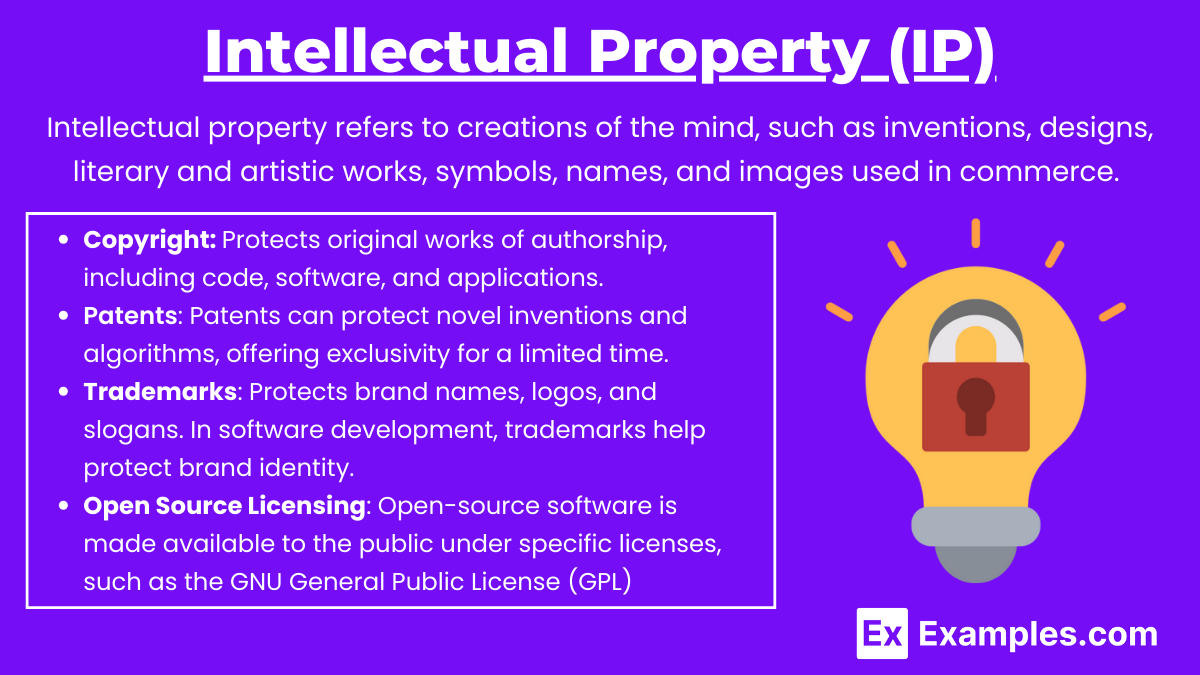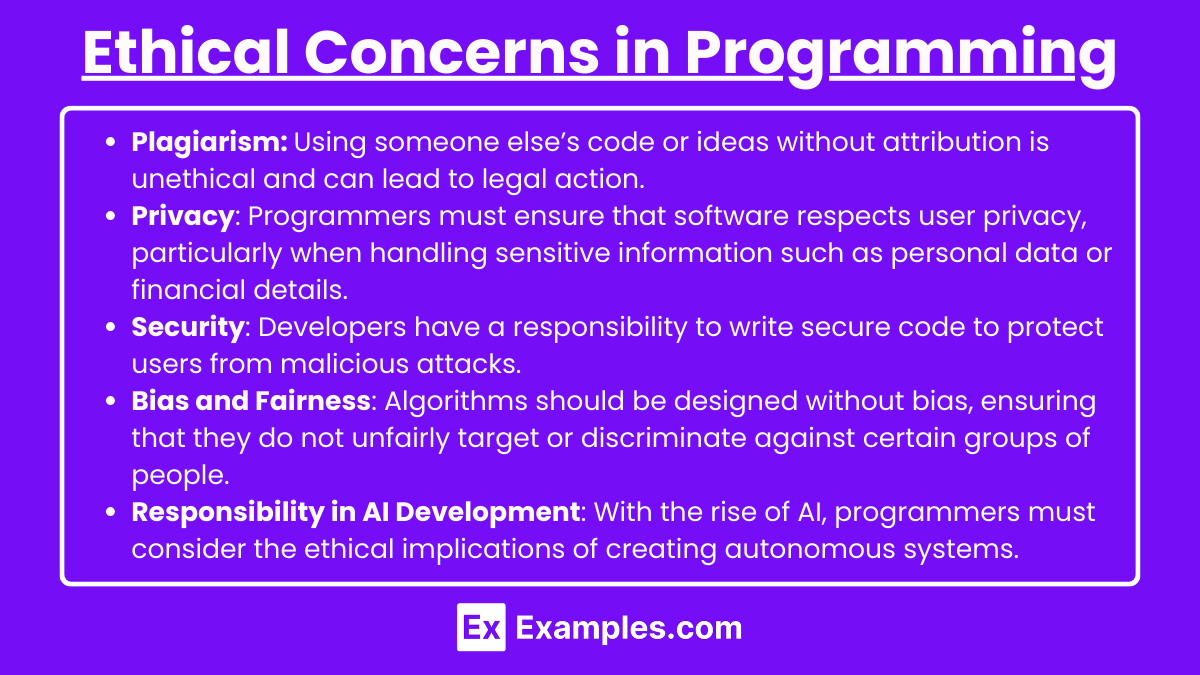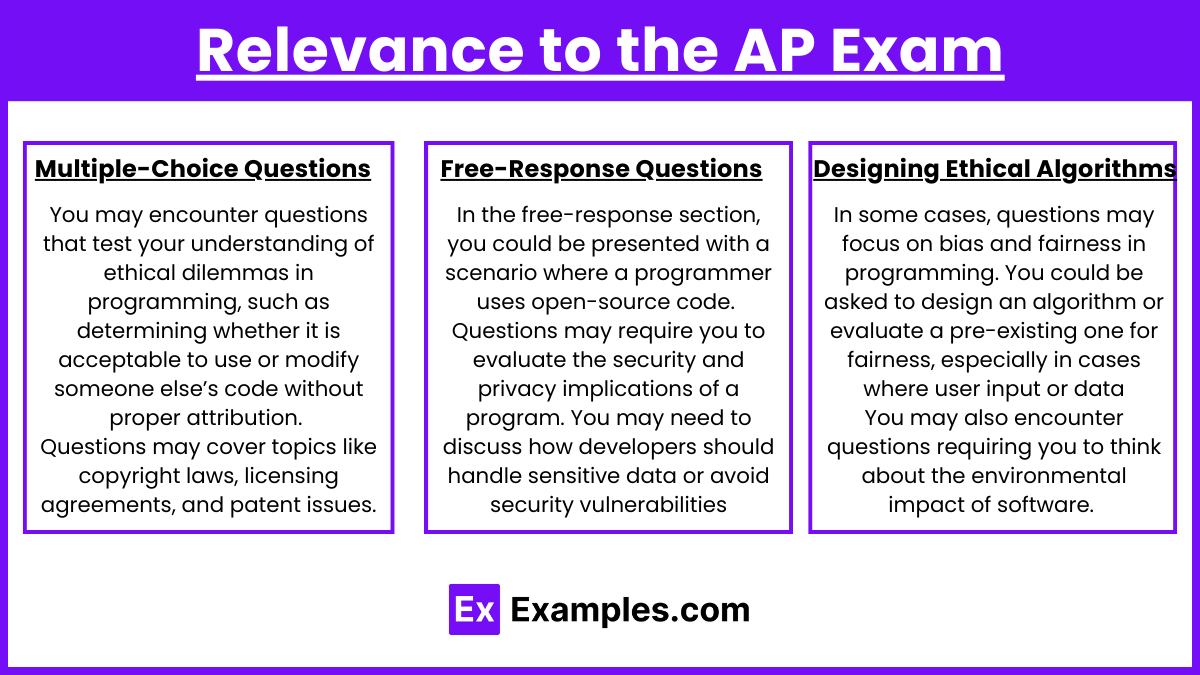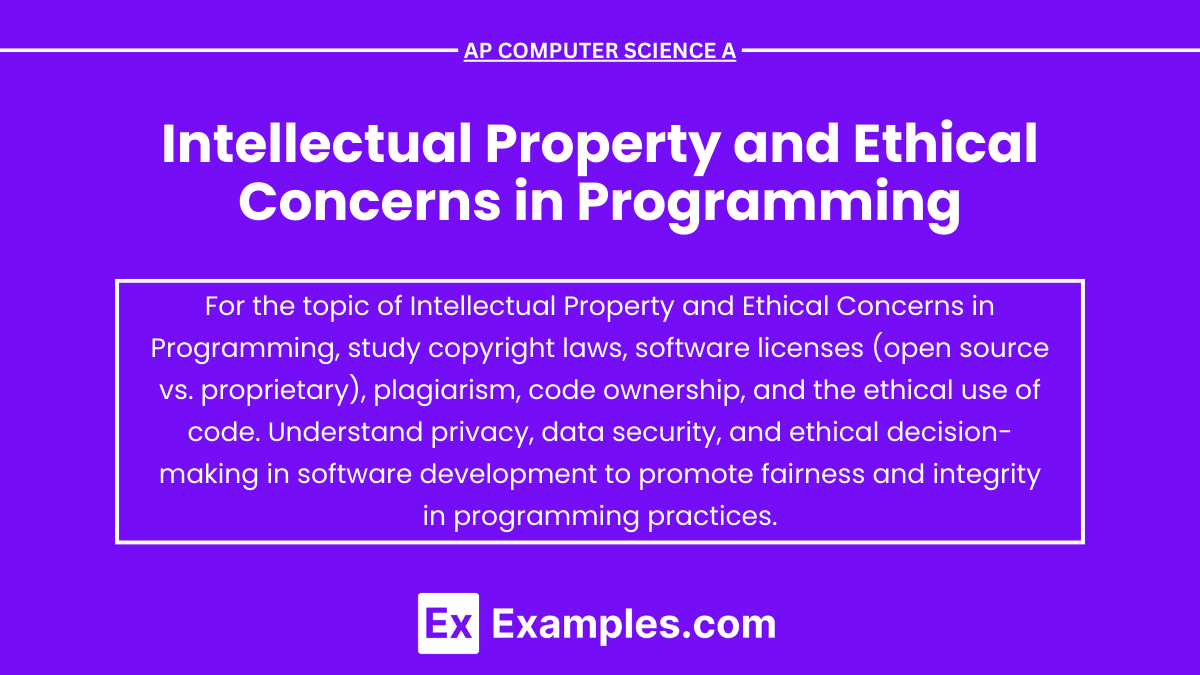In programming, understanding intellectual property (IP) and ethical concerns is crucial for responsible software development. Intellectual property laws protect creators’ rights over their software, algorithms, and designs through mechanisms like copyright, patents, and trademarks. Ethical considerations ensure that programmers maintain integrity, respect privacy, promote security, and avoid bias in their work. Addressing these concerns is essential for creating fair, secure, and legally compliant software. Mastery of these topics is vital for success on the AP Computer Science A Exam, particularly in evaluating software development practices.
Learning Objectives
When studying “Intellectual Property and Ethical Concerns in Programming” for the AP Computer Science A exam, you should focus on understanding the principles of intellectual property, including copyrights, patents, and software licenses. Learn how to ethically use, attribute, and share code, ensuring adherence to legal standards. Explore privacy, security, and bias in programming, recognizing your responsibility to protect user data and avoid discrimination. Additionally, understand the ethical implications of AI, sustainability, and plagiarism to ensure responsible and fair software development practices.
Intellectual Property (IP)

Intellectual property refers to creations of the mind, such as inventions, designs, literary and artistic works, symbols, names, and images used in commerce. In programming, IP plays a critical role in protecting software, algorithms, and digital products. Key concepts include:
- Copyright: Protects original works of authorship, including code, software, and applications. Software developers own the copyright to the code they write, preventing others from copying, distributing, or modifying it without permission.
- Patents: Patents can protect novel inventions and algorithms, offering exclusivity for a limited time. However, software patents are controversial because of their potential to stifle innovation.
- Trademarks: Protects brand names, logos, and slogans. In software development, trademarks help protect brand identity.
- Open Source Licensing: Open-source software is made available to the public under specific licenses, such as the GNU General Public License (GPL) or the MIT License, allowing users to view, modify, and distribute the software. These licenses maintain some control over how the software is used while promoting collaboration.
Ethical Concerns in Programming

Ethical concerns arise in programming when considering how software development impacts users, society, and fellow developers. Key issues include:
- Plagiarism: Using someone else’s code or ideas without attribution is unethical and can lead to legal action. Students and professionals must give proper credit to code sources, especially in collaborative projects or when using public libraries.
- Privacy: Programmers must ensure that software respects user privacy, particularly when handling sensitive information such as personal data or financial details. Misuse or theft of user data is both unethical and illegal.
- Security: Developers have a responsibility to write secure code to protect users from malicious attacks. Intentionally or negligently exposing vulnerabilities is unethical, and failing to update security measures can harm users.
- Bias and Fairness: Algorithms should be designed without bias, ensuring that they do not unfairly target or discriminate against certain groups of people. Ethical programming requires awareness of how decisions in code can lead to inequality or injustice.
- Responsibility in AI Development: With the rise of AI, programmers must consider the ethical implications of creating autonomous systems. This includes ensuring that AI behaves transparently and responsibly, avoiding harm to users.
Relevance to the AP Exam

Understanding intellectual property and ethical concerns is essential for scoring well on the AP Computer Science A Exam. You may encounter scenarios in multiple-choice questions or free-response sections where you’re asked to evaluate the ethics of code sharing, identify legal issues surrounding software licensing, or explain the importance of writing secure, privacy-respecting code.
Multiple-Choice Questions:
- Ethical Scenarios: You may encounter questions that test your understanding of ethical dilemmas in programming, such as determining whether it is acceptable to use or modify someone else’s code without proper attribution. These questions might ask you to identify legal and ethical actions based on specific licensing terms.
- Intellectual Property Rights: Questions may cover topics like copyright laws, licensing agreements, and patent issues. You may be asked to evaluate the rights of a developer regarding the distribution of their code and what constitutes a violation of these rights.
Free-Response Questions:
- Code Plagiarism: In the free-response section, you could be presented with a scenario where a programmer uses open-source code. You may be required to explain the ethical considerations, such as the necessity of adhering to the open-source license’s terms and giving proper credit to the original creator.
- Privacy and Security in Code: Questions may require you to evaluate the security and privacy implications of a program. You may need to discuss how developers should handle sensitive data or avoid security vulnerabilities, such as data leaks or unauthorized access.
Designing Ethical Algorithms:
- In some cases, questions may focus on bias and fairness in programming. You could be asked to design an algorithm or evaluate a pre-existing one for fairness, especially in cases where user input or data could lead to biased outcomes.
- You may also encounter questions requiring you to think about the environmental impact of software. For example, a question might prompt you to consider how efficient your code is, the resources it uses, or how it might contribute to sustainability in computing.
Examples
Example 1: Copyright Violation in Software Development
Suppose a developer copies a significant portion of code from a proprietary software without permission and uses it in their own application. This action violates copyright law, which protects the original author’s rights to control the distribution and use of their work. The ethical issue lies in failing to respect the intellectual property rights of others, which could lead to legal consequences for the developer.
Example 2: Open Source Misuse
In the open-source community, software is made available under licenses that allow public use, modification, and distribution. However, if a developer uses an open-source project and violates the terms of its license—such as failing to credit the original creators or using the code for commercial purposes against the license’s terms—it constitutes both an intellectual property violation and an ethical breach.
Example 3: Plagiarism in Code
A student or professional might submit a project using code they found online without proper attribution, claiming it as their own. This unethical behavior not only disregards the original author’s intellectual property but also damages the credibility of the person submitting the work. Ethical programming requires giving appropriate credit to code sources, especially in shared environments like collaborative projects.
Example 4: Data Privacy Breach
Consider a software application that collects and sells users’ personal data without their consent. Ethically, this violates the users’ privacy rights, and legally, it may breach regulations such as GDPR (General Data Protection Regulation). Developers have a responsibility to safeguard user data and ensure transparency in how information is collected, used, and shared.
Example 5: Algorithmic Bias
A developer creates a machine learning algorithm that unintentionally discriminates against certain demographic groups, such as favoring one gender or race in job application screenings. Ethically, the developer has a responsibility to evaluate and mitigate bias in their code, as such biases can lead to systemic discrimination and unfair treatment. This highlights the ethical imperative for fairness and inclusivity in software design.
Multiple Choice Questions
Question 1
Which of the following best describes the main purpose of copyright in software development?
A) To allow anyone to freely use and distribute software.
B) To protect a developer’s original code and prevent others from copying or distributing it without permission.
C) To ensure that software algorithms are kept secret from competitors.
D) To allow users to modify software as they see fit without restriction.
Correct Answer: B
Explanation: Copyright laws are designed to protect original works, including software code. When a developer writes code, they automatically own the copyright, meaning others cannot copy, distribute, or modify the software without permission. Copyright does not necessarily require keeping software secret (like a patent might), but it does ensure that the creator has control over how their work is used. Choices A and D refer to concepts more aligned with open-source licensing, which still operates under copyright law but with additional permissions. Choice C is incorrect because copyright does not require keeping software algorithms secret.
Question 2
What is an ethical concern related to the use of personal data in software development?
A) Ensuring that algorithms are efficient and run quickly on user devices.
B) Collecting user data without informing the user of its purpose.
C) Making the source code of a program open and available to everyone.
D) Ensuring that software does not contain any bugs.
Correct Answer: B
Explanation: One major ethical concern in programming is privacy. Collecting user data without the user’s knowledge or consent is a violation of privacy and can be illegal in many jurisdictions (e.g., GDPR in Europe). Developers must inform users about how their data will be collected, used, and stored. Answer A refers to an unrelated concern (efficiency), while C refers to open-source software, which is an intellectual property decision but not an ethical concern regarding user privacy. Answer D refers to bugs in the code, which is a quality concern, not an ethical one.
Question 3
Which of the following is not considered a violation of intellectual property rights in software development?
A) Copying code from an open-source project and not giving attribution to the original developers.
B) Modifying proprietary software and redistributing it without permission.
C) Using code snippets from a public domain source without credit.
D) Distributing pirated copies of commercial software.
Correct Answer: C
Explanation: Code that is in the public domain is free for anyone to use without needing to give credit or seek permission. Therefore, using public domain code is not a violation of intellectual property rights. All other choices are examples of IP violations. Answer A describes plagiarism in open-source projects, which requires attribution. Answer B involves modifying proprietary software, which typically requires permission from the original creator. Answer D involves piracy, a direct violation of copyright law.


